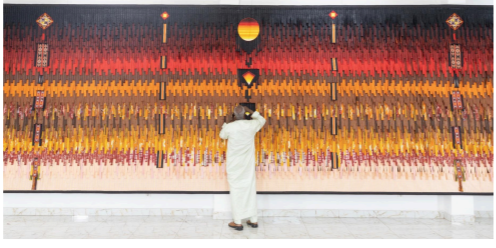“Sambadio” is the name of Abdoulaye Konaté’s new exhibition at Efie Gallery, UAE. The exhibition pays homage to Bedouin culture, offering audiences a unique opportunity to explore the connections between West Africa and the Middle East. To understand these links, ANA interviews Abdoulaye Konaté about his relationship with music, and art, and his words of wisdom for young and upcoming African artists.
R.M: In your opinion, what is the true purpose of art?
A.K: This is a very complicated question and difficult to answer, but for me, what is most important in art is our contribution to collective well-being—encompassing mental, physical, and personal struggles—while advocating for cultural tolerance and nonviolence.
R.M: How has music inspired your creative process, especially with your piece Sambadio, which draws inspiration from Ali Farka Touré’s new album The Voyageur?
AK: I have always listened to music, whether African, Western, or traditional. I mean artists like Bazoumana Sissoko, Ali Farka, Salif Keita, and many other Malian musicians, as well as classical music. Sometimes, we understand our local music more quickly due to its content, as 90% of ancient African music is based on societal themes. Sambadio is part of that; it’s legendary and always inspiring, whether in the visual arts or practical life—it is an example of bravery.

R.M: What role does education play in nurturing future African artists?
A.K: I believe education is essential for training, knowledge, and research. For African artists, having a solid educational foundation is crucial to push the boundaries of creativity.
R.M: What does decolonization mean in the context of art?
A.K: I have rarely participated in such concepts; I avoid these debates as much as possible because they tend to be more philosophical and intellectual than what I engage with in my artistic practice. My focus is often on what interests me aesthetically, and I continuously present social conversations that are significant and transcend them through my work.
R.M: In a previous interview with *Brilliant Ideas*, you mentioned, “I don’t think artists have to be socially engaged.” Could you expand on that statement?
A.K: Perhaps I did not express myself well or was misunderstood. I wanted to clarify that the freedom to engage socially or not depends on each artist. Some choose to be engage, while others do not. It is a total freedom for the artist.
R.M: What do you think the future holds for contemporary art in Africa, given your role as an inspiration to so many artists?
A.K: We follow in the footsteps of other artists, and we believe that others will come after us. Creation is a chain of human thought and reflection, and it should be continuous. However we must not overlook the cultural roots of our people.

R.M: Where can people view your work in Africa?
A.K: Unfortunately, my works are outside the African continent than within it, but this is changing. We have many fairs and some museums, so more artists have had the opportunity in the last twenty years to be present on the African continent. We are fortunate to have some works with certain collectors and institutions, and when we hold exhibitions in museums or fairs, as I mentioned earlier, these are rare but existing opportunities today.
R.M: What advice would you give to young, emerging artists?
A.K: The main advice is to work hard. Focus on research and be persistent in what you do. I would tell them that nothing comes by chance. While chance does exist, it requires constant effort and deep reflection.
Abdoulaye Konate’s new catalog, Sambadio which features contributing writers Simon Njami and Professor Yacouba Konaté, Awa Konaté; edited by Toga Al Tahira is now available at Effie Gallery.
Click here to learn more.


